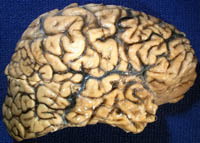Alzheimer's disease can be prevented thanks to fish oil
It sounds quite surprising that fish oil can bear any fruit in the medical field. But it really does!

First of all fish oil is recommended for a healthy diet because it contains the omega-3 fatty acids that reduce inflammation throughout the body.However, the preferred source of Omega 3 should be from the fish's body, not the liver. The liver and liver products (such as cod liver oil) of fish and many animals (such as seals and whales) contain Omega-3, but also the active form of vitamin A. At high levels, this form of the vitamin can be dangerous.
Studies were conducted on prisoners in England where the inmates were fed seafood which contains Omega-3 Fatty acids. The higher consumption of these fatty acids led to a drop in the assault rates. Another Finnish study found that prisoners who were convicted of violence had lower levels of omega–3 fatty acids than prisoners convicted of nonviolent offenses. It was suggested that these kinds of fatty acids are responsible for the neuronal growth of the frontal cortex of the brain which, it is further alleged, is the seat of personal behavior.
The American Heart Association recommends the consumption of 1g of fish oil daily, preferably by eating fish, for patients with coronary heart disease.
The US National Institutes of Health lists three conditions for which fish oil and other omega-3 sources are most highly recommended: hypertriglyceridemia, secondary cardiovascular disease prevention and high blood pressure. It then lists 27 other conditions for which there less evidence. It also lists possible safety concerns: "Intake of 3 grams per day or greater of omega-3 fatty acids may increase the risk of bleeding, although there is little evidence of significant bleeding risk at lower doses. Very large intakes of fish oil/omega-3 fatty acids ("Eskimo" amounts) may increase the risk of hemorrhagic (bleeding) stroke."
According to a study from Louisiana State University in September 2005, fish oil may help protect the brain from cognitive problems associated with Alzheimer's disease.
It was proved by a group of researchers at the University of California, Los Angeles (UCLA).
Their study was published in the Dec. 26 issue of the Journal of Neuroscience, saying that the omega-3 fatty acid docosahexaenoic acid (DHA) raises the production level of LR11, a protein found at reduced levels in Alzheimer's patients. LR11 destroys the protein that forms the plaques that are actually a foundation for a protein called beta amyloid, which is thought to be toxic to brain cells. Higher levels of LR11 prevent the manufacturing of the toxic proteins.
Alzheimer's disease (AD) is a neurodegenerative disease that, in its most common form, is found in people over the age of 65. Clinical signs of Alzheimer's disease are characterized by progressive cognitive deterioration, together with declining activities of daily living and by neuropsychiatric symptoms or behavioral changes. It is the most common type of dementia.
The researchers will have to find out a dosage of DHA that people could take to prevent Alzheimer's. It’s highly recommend to eat more fatty fish or take a supplement. But it’s not recommend to take DHA to try to slow the progression of Alzheimer's.
Subscribe to Pravda.Ru Telegram channel, Facebook, RSS!



